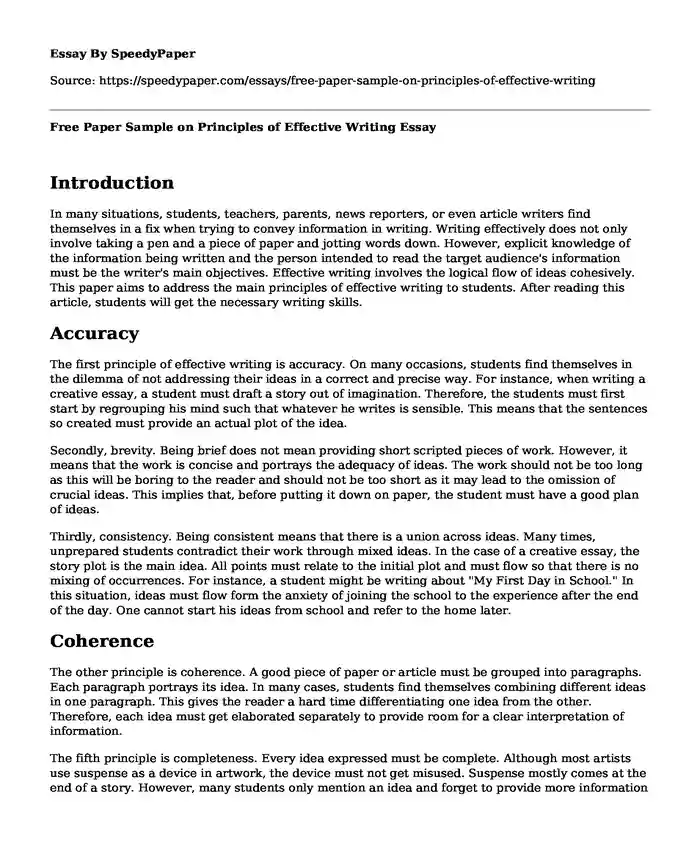Introduction
In many situations, students, teachers, parents, news reporters, or even article writers find themselves in a fix when trying to convey information in writing. Writing effectively does not only involve taking a pen and a piece of paper and jotting words down. However, explicit knowledge of the information being written and the person intended to read the target audience's information must be the writer's main objectives. Effective writing involves the logical flow of ideas cohesively. This paper aims to address the main principles of effective writing to students. After reading this article, students will get the necessary writing skills.
Accuracy
The first principle of effective writing is accuracy. On many occasions, students find themselves in the dilemma of not addressing their ideas in a correct and precise way. For instance, when writing a creative essay, a student must draft a story out of imagination. Therefore, the students must first start by regrouping his mind such that whatever he writes is sensible. This means that the sentences so created must provide an actual plot of the idea.
Secondly, brevity. Being brief does not mean providing short scripted pieces of work. However, it means that the work is concise and portrays the adequacy of ideas. The work should not be too long as this will be boring to the reader and should not be too short as it may lead to the omission of crucial ideas. This implies that, before putting it down on paper, the student must have a good plan of ideas.
Thirdly, consistency. Being consistent means that there is a union across ideas. Many times, unprepared students contradict their work through mixed ideas. In the case of a creative essay, the story plot is the main idea. All points must relate to the initial plot and must flow so that there is no mixing of occurrences. For instance, a student might be writing about "My First Day in School." In this situation, ideas must flow form the anxiety of joining the school to the experience after the end of the day. One cannot start his ideas from school and refer to the home later.
Coherence
The other principle is coherence. A good piece of paper or article must be grouped into paragraphs. Each paragraph portrays its idea. In many cases, students find themselves combining different ideas in one paragraph. This gives the reader a hard time differentiating one idea from the other. Therefore, each idea must get elaborated separately to provide room for a clear interpretation of information.
The fifth principle is completeness. Every idea expressed must be complete. Although most artists use suspense as a device in artwork, the device must not get misused. Suspense mostly comes at the end of a story. However, many students only mention an idea and forget to provide more information to support it. This may not be referred to as suspense but incompleteness. The work must be thorough to avoid unclear statements.
Next, clarity. Every piece of art must have an exact meaning. In most professional writes, documents consist of a thesis statement. The thesis is the main point of reference for the writer. Every point or remark made in the paper must relate to the thesis. This means that anything written away from the thesis is not clear.
Another fundamental principle of effective writing is emphasis. It is almost the same as completeness. However, there is a slight difference in that emphasis elaborates on an idea and involves a narration into the main areas of the expressed idea. The emphasis sees the use of examples to make sure the point sinks well into the reader’s mind. Without examples, a reader might read an article but fail to grab the intended writer’s voice.
Conclusion
Lastly, diction. This refers to the choice of words in the article. Sentences with simple structures and words are best for student writers. Using too many vocabularies and drafting too long sentences leads to inconsistency. The main aim of writing it to make the audience understand your points. Thus, a simple language gives the reader the morale of wanting to read more.
Cite this page
Free Paper Sample on Principles of Effective Writing. (2023, Nov 25). Retrieved from https://speedypaper.com/essays/free-paper-sample-on-principles-of-effective-writing
Request Removal
If you are the original author of this essay and no longer wish to have it published on the SpeedyPaper website, please click below to request its removal:
- Reflective Essay Sample
- Free Essay on Children With Special Needs Inclusion
- Paper Example on Essay and Text Message Writing
- Text Analysis of Hamlet by William Shakespeare: Essay Sample
- Essay Sample on Smoke-Auggie Wren's Christmas Story
- Essay Sample on Role of Research in Criminal Justice System
- Harmony in Diversity: Unveiling Connections and Urging Unity in Walt Whitman's 'Song of Myself' - Free Paper
Popular categories





